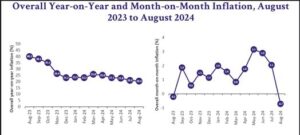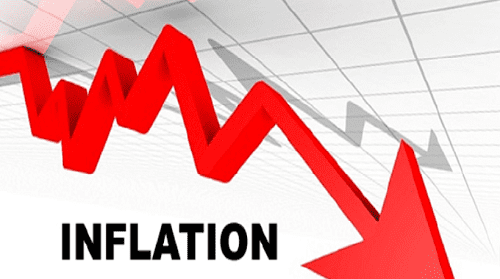- Market watchers warn of remaining upside risks
By Joshua Worlasi AMLANU & Ebenezer Chike Adjei NJOKU
Consumer inflation dropped to 20.4 percent in August 2024, down from 20.9 percent in July – marking the fifth consecutive month of easing inflation, according to latest data from the Ghana Statistical Service (GSS).
While it is more than double the Bank of Ghana’s (BoG) target of 10 percent, the recent decline suggests that the country is making strides in mitigating inflationary pressures. This positive trend aligns with the predictions of many analysts who anticipate that inflation will conclude the year within the high-teen range.
Food inflation continues to be a key driver of the country’s overall inflation. In August 2024, year-on-year food inflation stood at 21.5 percent – slightly down from 21.7 percent in July. Non-food inflation also decreased, falling from 20.5 percent in July to 19.1 percent in August.

Month-on-month inflation saw a significant reduction, falling by 0.7 percent between July and August; a sharp contrast to the 2.1 percent increase recorded in July. This decrease is partly attributed to seasonal factors such as availability of agricultural produce, which helped lower food prices. Non-food inflation, on the other hand, rose slightly by 0.7 percent during the same period.
The drop in month-on-month inflation offers hope for some economic relief. However, experts have in recent weeks cautioned that this trend may not signal a full stabilisation, given the potential for global economic shocks and domestic challenges to resurface in coming months.
Dynamics
The GSS stated that Upper East Region recorded the highest inflation rate at 27.8 percent while North East Region posted the lowest rate at 10.1 percent, even as the full extent of droughts in certain parts of the country is yet to be fully measured.
Locally produced goods experienced higher inflation than imported goods. Inflation for locally produced items reached 22.2 percent compared to 16.1 percent for imported goods. This suggests that domestic supply chain issues and rising production costs are putting upward pressure on prices for locally sourced goods.

Cautious optimism
The reduced inflation rate in August 2024 signals the potential for more stable economic conditions and could mark the beginning of a broader economic recovery.
However, analysts remain cautious about the long-term sustainability of these improvements.
Depreciation of the cedi, along with external factors such as fluctuations in global oil prices and disruptions in the global food supply, may pose risks to the current inflation trends. As a result, the inflation outlook for coming months remains uncertain.
Monetary Responses
Policymakers are expected to closely monitor inflation trends in coming months. The Bank of Ghana, which has maintained a strict monetary policy stance with an elevated policy rate of 29 percent and a Cash Reserve Ratio (CRR) of 15 percent, is likely to adjust its strategies based on the ongoing inflation dynamics.
Potential interest rate changes could be implemented in the next Monetary Policy Committee (MPC) meeting taking place this month, to further control inflationary pressures if needed.
Inflation Trends in 2024
In first-half 2024 the inflation rate followed a disinflationary path, particularly in the second quarter. By June 2024 the annual inflation rate had decreased to 22.8 percent, down from 25.8 percent in March. This slowdown was driven by both tight monetary conditions and the base effect from the previous year’s high inflation rates.
Food inflation in June 2024 was 24 percent, a significant decrease from 29.6 percent in March – and non-food inflation also moderated slightly, falling from 22.6 percent to 21.6 percent over the same period. However, rising transport costs and fuel prices continued to impact inflation in specific categories such as transportation and energy.










